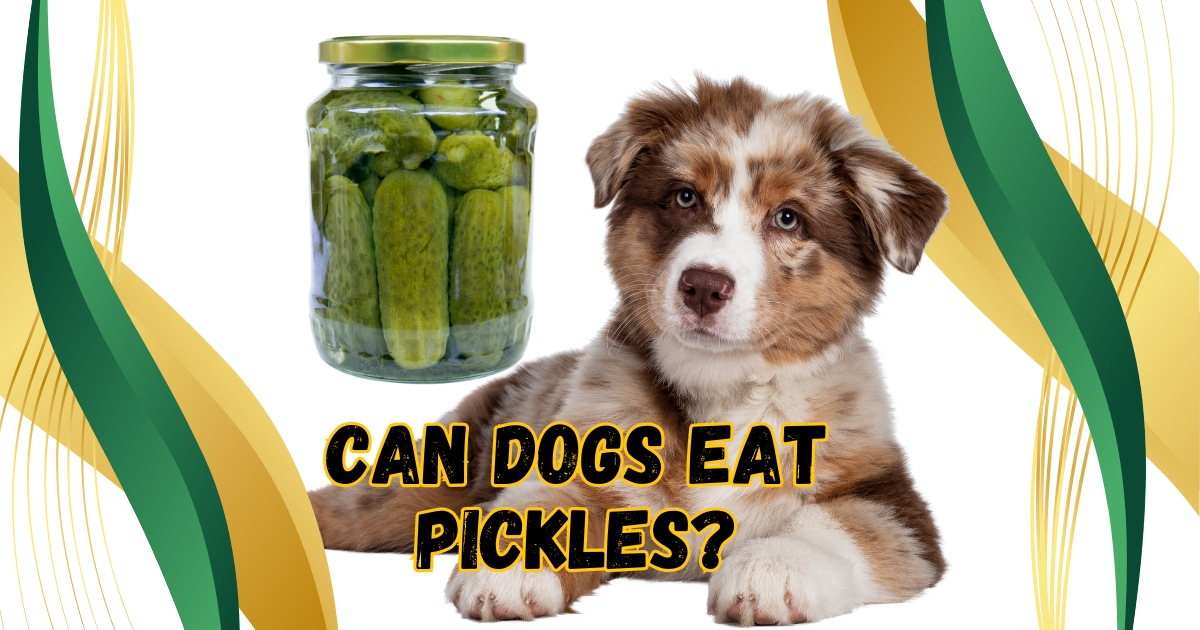As dog owners, we always want to make sure our furry friends stay happy and healthy, which includes being mindful of what they eat. While it’s tempting to share snacks with our dogs, some human foods can be harmful or even dangerous for them. One such food that raises questions is pickles. Can dogs eat pickles? Are they a safe snack, or do they pose health risks?
In this comprehensive guide, we’ll explore whether pickles are safe for dogs, the potential health risks, and what to do if your dog eats pickles. We’ll also discuss the differences between dill and sweet pickles, and suggest healthier alternatives to pickles that are safe for dogs to eat. Whether your dog is eyeing your sandwich or you’re simply curious, this guide will provide everything you need to know about dogs and pickles.
1. Can Dogs Eat Pickles? Understanding the Facts
The simple answer to the question “Can dogs eat pickles?” is no, it’s not recommended. While pickles themselves are not inherently toxic to dogs, they contain ingredients that can be harmful, especially when consumed in large amounts.
Pickles are made from cucumbers, which are safe for dogs to eat in moderation. However, the process of pickling involves soaking cucumbers in a brine solution made of salt, vinegar, and various spices. These ingredients are what make pickles unhealthy for dogs.
- High sodium content: Pickles are loaded with salt, which can be dangerous for dogs. A diet high in sodium can lead to a condition called sodium ion poisoning, causing symptoms like vomiting, diarrhea, lethargy, tremors, and even seizures in extreme cases.
- Vinegar: While small amounts of vinegar may not harm dogs, large quantities can irritate their digestive systems, leading to stomach upset, vomiting, or diarrhea.
- Spices and seasonings: Many pickles contain spices like garlic and onions, both of which are toxic to dogs. Even in small amounts, these ingredients can cause serious health issues, including damage to a dog’s red blood cells.
Because of these potential risks, it’s best to avoid giving pickles to your dog. While a small taste may not cause harm, it’s always better to err on the side of caution and choose healthier treats for your dog.
2. What Happens If a Dog Eats Pickles? Potential Health Risks
If your dog manages to snag a pickle or two, you may be wondering what the consequences could be. While a small amount of pickle may not immediately harm your dog, there are several health risks to be aware of, especially if your dog consumes pickles regularly or in large quantities.
- Salt poisoning: One of the biggest concerns is the high salt content in pickles. Dogs don’t need much salt in their diet, and too much can lead to salt poisoning or sodium ion poisoning. Symptoms include excessive thirst, vomiting, diarrhea, lethargy, and in severe cases, seizures. If your dog consumes a large number of pickles, salt poisoning can become a life-threatening emergency.
- Gastrointestinal upset: The vinegar and spices used in pickles can irritate your dog’s digestive system, leading to symptoms like stomach pain, vomiting, and diarrhea. Dogs with sensitive stomachs may be particularly vulnerable to these effects.
- Toxic ingredients: Some pickles are made with garlic, onions, or other toxic seasonings. Both garlic and onions are known to damage a dog’s red blood cells, potentially leading to anemia. If your dog eats pickles containing these ingredients, it’s essential to monitor them closely and consult your vet if any concerning symptoms appear.
While an occasional bite of pickle may not cause significant harm, the potential health risks make it a food best avoided for dogs. If your dog eats pickles and starts showing any unusual symptoms, it’s important to seek veterinary care immediately.
3. Can Dogs Eat Dill Pickles or Sweet Pickles? Key Differences Explained
Many people wonder whether different types of pickles, like dill pickles or sweet pickles, are safer for dogs. The truth is, while there are some differences between the two, neither type of pickle is considered safe for dogs.
- Dill pickles: Dill pickles are made by pickling cucumbers in a brine solution of water, salt, vinegar, and dill. While dill itself is not toxic to dogs, the high salt content and vinegar used in the pickling process make dill pickles a poor choice for dogs. The amount of salt alone can pose serious risks, and the vinegar may upset your dog’s stomach.
- Sweet pickles: Sweet pickles are made with sugar in addition to salt and vinegar. While the sweetness may make them more appealing to dogs, the added sugar is not healthy for them. High sugar intake can lead to obesity, diabetes, and other health issues. Moreover, sweet pickles may still contain toxic ingredients like garlic or onions, making them just as dangerous as dill pickles.
In general, it’s best to avoid feeding your dog any type of pickle, whether dill, sweet, or otherwise. The risks outweigh any potential benefits, and there are plenty of healthier snacks that you can offer instead.
If you’re ever unsure about whether a certain type of food is safe for your dog, it’s always a good idea to consult your vet before offering it to them.
Wondering what other human foods are risky for dogs? Check out this must-read guide: Can Dogs Eat Tuna? 5 Vital Facts You Shouldn’t Ignore to ensure your pet’s safety.
4. Why Are Pickles Bad for Dogs? The Hidden Dangers
Pickles may seem like a harmless snack, but they hide several dangerous ingredients that make them unsuitable for dogs. Here’s a closer look at the main reasons why pickles are bad for dogs:
- High salt content: Pickles are preserved in a salty brine, which can lead to sodium poisoning in dogs. Dogs don’t need much salt in their diet, and too much can cause symptoms like excessive thirst, vomiting, diarrhea, and even life-threatening conditions like seizures.
- Vinegar: While vinegar is used in small amounts in some dog-friendly treats, the quantity in pickles can upset your dog’s stomach. Consuming too much vinegar may lead to gastrointestinal irritation, causing vomiting or diarrhea.
- Garlic and onions: Many pickles are flavored with garlic and onions, both of which are toxic to dogs. These ingredients can damage a dog’s red blood cells, leading to anemia. Even a small amount of garlic or onion can cause serious health problems for your dog.
- Sugar in sweet pickles: Sweet pickles contain added sugar, which is unhealthy for dogs. Regular consumption of sugary foods can lead to weight gain, obesity, and diabetes in dogs, which can reduce their quality of life.
In short, while cucumbers themselves are safe for dogs to eat, the ingredients used in the pickling process make pickles dangerous for dogs. It’s best to avoid giving them pickles altogether to prevent any potential health risks.
5. What to Do If Your Dog Eats Pickles: Steps to Take
If your dog accidentally eats pickles, don’t panic, but it’s important to take the right steps to ensure their safety. Here’s what you should do:
- Assess the situation: Determine how much pickle your dog has eaten and whether the pickles contained any harmful ingredients like garlic or onions. Check the ingredients list if possible.
- Watch for symptoms: Keep a close eye on your dog for any signs of distress or illness. Symptoms to watch for include vomiting, diarrhea, lethargy, excessive thirst, and bloating. If your dog shows any of these symptoms, call your veterinarian right away.
- Provide water: Offer plenty of fresh water to help flush out any excess sodium or vinegar from their system. This can help minimize the risk of dehydration or salt poisoning.
- Contact your vet: If your dog has consumed a large number of pickles or if they were flavored with toxic ingredients like garlic or onions, it’s best to contact your vet for advice. They may recommend bringing your dog in for an examination or providing specific treatment at home.
- Prevent future incidents: To avoid future accidents, keep pickles and other harmful foods out of your dog’s reach. Store them in sealed containers and educate family members about which foods are unsafe for your pet.
By taking these steps, you can help minimize the risk and ensure your dog stays healthy even after eating pickles.
Conclusion
While pickles are not toxic to dogs, they contain ingredients like salt, vinegar, and potentially garlic or onions that can be harmful to your pet’s health. Even though a small bite of pickle may not cause immediate harm, it’s best to avoid feeding them to your dog to prevent any potential health risks, such as sodium poisoning or gastrointestinal distress.
If your dog accidentally eats pickles, it’s essential to monitor them for any signs of illness and contact your vet if needed. Offering healthier alternatives like cucumbers, carrots, or pumpkin is a safer way to treat your dog without compromising their well-being.
By staying informed and taking preventive measures, you can keep your dog safe and healthy while enjoying a variety of nutritious, dog-friendly snacks
FAQs
- Can dogs eat pickles?
- No, it’s not recommended. While pickles are not toxic to dogs, their high salt content, vinegar, and spices can cause health issues such as sodium poisoning, gastrointestinal upset, or even damage to red blood cells.
- What are the risks if my dog eats pickles?
- If your dog eats pickles, the risks include salt poisoning, gastrointestinal upset, and exposure to harmful ingredients like garlic and onions, which can cause anemia and other health problems.
- Are dill pickles safer for dogs than sweet pickles?
- No, both types are unsafe. Dill pickles contain high salt and vinegar, while sweet pickles have added sugar, which can lead to obesity and diabetes. Both types can also contain harmful spices.
- What should I do if my dog eats pickles?
- If your dog eats pickles, monitor them for symptoms like vomiting, diarrhea, or excessive thirst. Contact your vet if they show signs of distress, especially if the pickles contained toxic ingredients like garlic or onions.
- Why are pickles harmful to dogs?
- Pickles are harmful due to their high salt content, vinegar, and spices like garlic and onions. These ingredients can lead to sodium poisoning, digestive issues, and even toxicity.
- Can dogs eat cucumbers, the main ingredient in pickles?
- Yes, fresh cucumbers are safe for dogs in moderation. They are hydrating, low in calories, and provide a crunchy treat without the risks associated with pickles.
- What are some healthy alternatives to pickles for dogs?
- Healthy alternatives include cucumbers, carrots, apples (without seeds), green beans, blueberries, and plain canned pumpkin. These are nutritious and safe treats for your dog.
- How can I prevent my dog from eating pickles or other harmful foods?
- Store food securely in sealed containers or high shelves, use commands like “leave it,” supervise meals and snacks, and be cautious during outdoor activities to prevent your dog from scavenging.
- Is a small amount of pickle harmful to dogs?
- While a small bite may not cause immediate harm, regular consumption or larger amounts can lead to salt poisoning or digestive upset. It’s best to avoid feeding pickles altogether.
- Can vinegar in pickles hurt my dog?
- Yes, large amounts of vinegar can irritate your dog’s digestive system, leading to stomach upset, vomiting, and diarrhea.




